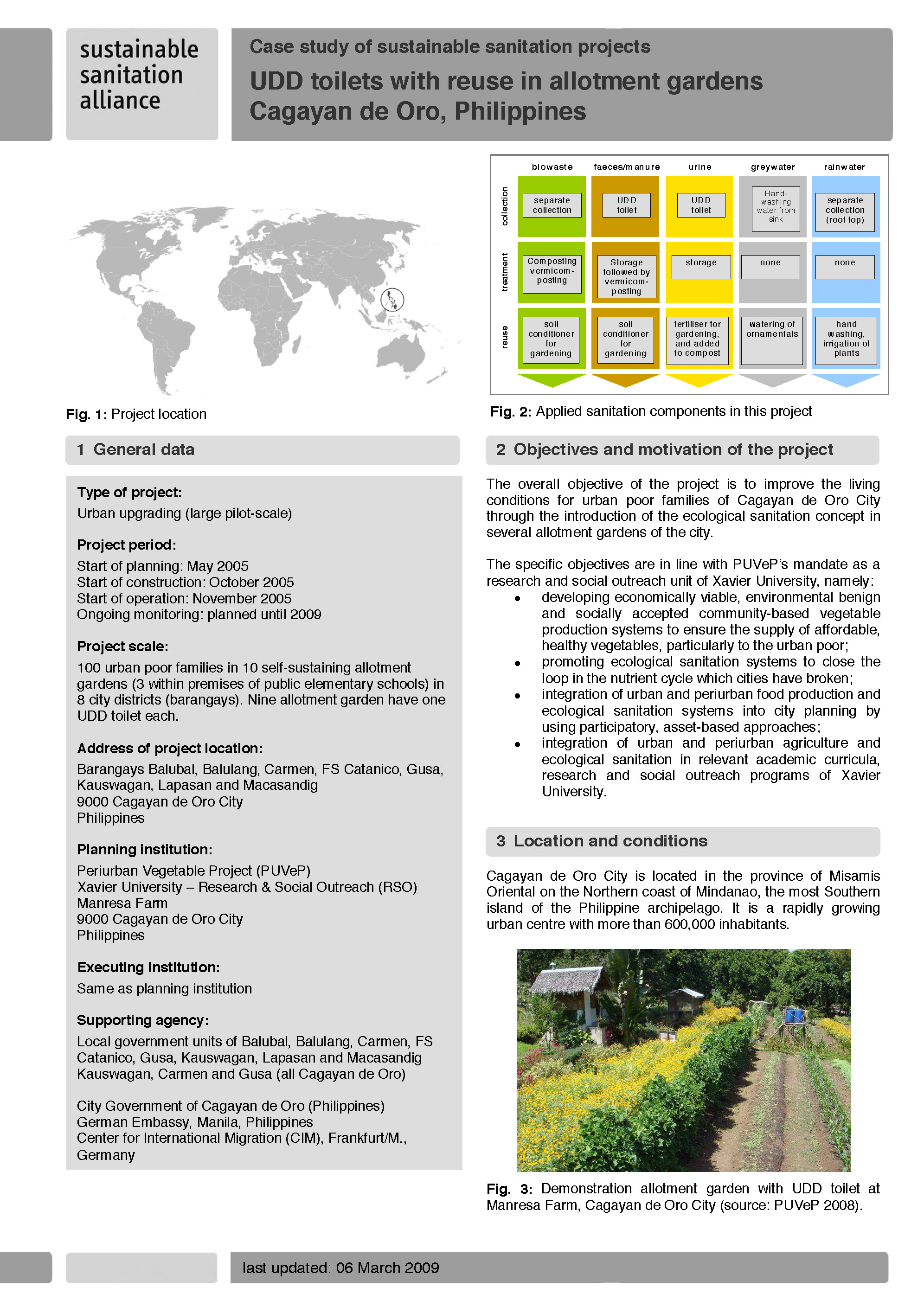UDD toilets with reuse in allotment gardens Cagayan de Oro, Philippines - Case study of sustainable sanitation projects
Holmer, R., Factura III, H., Miso, A., Sol, G., Santos Jr., C., Elorde, E., Lee, S., Montes, A. (2009)

Published in: 2009
Publisher:
Sustainable Sanitation Alliance (SuSanA)
Author:
Holmer, R., Factura III, H., Miso, A., Sol, G., Santos Jr., C., Elorde, E., Lee, S., Montes, A.
Uploaded by:
SuSanA secretariat
Partner profile:
common upload
11605 Views
213 Downloads
Location of library entry
Content - Summary
This case study is about a large pilot scale project to upgrade sanitation in urban area. The project provided UDDTs for 100 urban poor families in 10 self-sustaining allotment gardens. It was implemented by GTZ on behalf of the German Ministry BMZ.
The overall objective of the project is to improve the living conditions for urban poor families of Cagayan de Oro City through the introduction of the ecological sanitation concept in several allotment gardens of the city. The specific objectives are in line with PUVeP’s mandate as a
research and social outreach unit of Xavier University, namely:
· developing economically viable, environmental benign and socially accepted community-based vegetable production systems to ensure the supply of affordable, healthy vegetables, particularly to the urban poor;
· promoting ecological sanitation systems to close the loop in the nutrient cycle which cities have broken;
· integration of urban and periurban food production and ecological sanitation systems into city planning by using participatory, asset-based approaches;
· integration of urban and periurban agriculture and ecological sanitation in relevant academic curricula, research and social outreach programs of Xavier University.
Further project components are:
· Research on agricultural reuse, health and socioeconomic aspects of ecological sanitation
· Capacity building on ecological sanitation for the government, non-government and private sector. Integration of ecological sanitation in relevant academic curricula of Xavier University’s School of Medicine as well as the Colleges of Agriculture and Engineering.
· Policy advocacy to decision makers such as assistance in drafting an executive order for the establishment of a technical working group on sustainable sanitiation for the city government of Cagayan de Oro, and consultancy for the Philippine House of Representatives in drafting a so-called “Ecosan Act” (June 2008).
· Showcasing of different ecosan technologies (UDDT, composting, vermicomposting, biogas and rainwater harvesting) at Manresa Farm to more than 1500 visitors from different parts of the Philippines as well as other countries. A highlight was the visit of Ms. Chin-Chin Gutierrez in July 2007, a multi-awarded Filipino actress and a Time Magazine Asian Heroine for the Environment.
A basic assessment was carried out to indicate in which of the five sustainability criteria for sanitation (according to the SuSanA Vision Document 1) this project has its strengths and which aspects were not emphasized (weaknesses).
Regarding the long-term impacts of this project, it can be said that the establishment of these gardens has significantly contributed to the improvement of food security of the participating families as well as of the neighbouring families who can buy fresh, affordable and safe vegetables. Another advantage besides gardening is the fact that the gardeners collect the biodegradable wastes from the neighbouring
households for composting.
This project has also served as a research and teaching facilitiy and the concept is being copied by others (see for example SuSanA case study on ecosan projects in Misamis Oriental implemented by WAND Foundation in the Philippines, www.susana.org).
Bibliographic information
Holmer, R., Factura III, H., Miso, A., Sol, G., Santos Jr., C., Elorde, E., Lee, S., Montes, A. (2009). UDD toilets with reuse in allotment gardens Cagayan de Oro, Philippines - Case study of sustainable sanitation projects. Sustainable Sanitation Alliance (SuSanA)
Filter tags
Case studies in SuSanA template East Asia & Pacific English Urban (entire city) Urine Urine diversion dehydration toilets (UDDTs)














